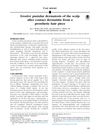 8 citations,
June 2019 in “Journal of Ginseng Research”
8 citations,
June 2019 in “Journal of Ginseng Research” Gintonin-enriched fraction promotes hair growth and could be a potential alopecia treatment.
 86 citations,
January 2008 in “Journal of nutritional & environmental medicine”
86 citations,
January 2008 in “Journal of nutritional & environmental medicine” Green tea may help with health issues like cancer, heart disease, and weight loss due to its high catechin content.
 23 citations,
October 1988 in “Clinics in Dermatology”
23 citations,
October 1988 in “Clinics in Dermatology” Minoxidil was first made for high blood pressure, but it was later found to help hair growth.
[object Object]  7 citations,
December 2021 in “Pharmaceutics”
7 citations,
December 2021 in “Pharmaceutics” Natural products like plant extracts can help promote hair growth and could be used to treat hair loss.
 6 citations,
July 2003 in “Journal of Womens Health”
6 citations,
July 2003 in “Journal of Womens Health” Experts say proper treatment and sensitivity are important for women's facial skin issues like acne and unwanted hair.
40 citations,
January 2018 in “International journal of trichology” Healthy scalp reduces hair loss by managing oxidative stress.
 17 citations,
February 2015 in “Phytochemistry Reviews”
17 citations,
February 2015 in “Phytochemistry Reviews” Southeast Asian herbs show promise for skin and hair care, but more research is needed to confirm their effectiveness in cosmetics.
 9 citations,
March 2017 in “JAAD Case Reports”
9 citations,
March 2017 in “JAAD Case Reports” A woman's scalp condition improved with specific ointment after a hair piece caused skin issues.
7 citations,
August 2020 in “Plastic and reconstructive surgery. Global open” QR 678 and QR 678 Neo are safe and promote hair growth, potentially helping chemotherapy-induced hair loss.
 7 citations,
January 2018 in “Skin appendage disorders”
7 citations,
January 2018 in “Skin appendage disorders” The document suggests recognizing "trichiatrists" as doctors specializing in hair and scalp health, using evidence-based treatments.
5 citations,
March 2022 in “Frontiers in Cell and Developmental Biology” Colostrum-derived exosomes can promote hair growth and may be a promising treatment for hair loss.
 4 citations,
September 2020 in “BioMed Research International”
4 citations,
September 2020 in “BioMed Research International” Timosaponin BII, a plant extract, was found to promote hair growth in mice, similarly to minoxidil.
 3 citations,
April 2022 in “Clinical, Cosmetic and Investigational Dermatology”
3 citations,
April 2022 in “Clinical, Cosmetic and Investigational Dermatology” Different methods, including stress management, healthy diet, supplements, and treatments like minoxidil, can help hair grow back after COVID-19 related hair loss.
 3 citations,
March 2022 in “Haya: the Saudi journal of life sciences”
3 citations,
March 2022 in “Haya: the Saudi journal of life sciences” Dates may improve heart health, fight infections, protect kidneys, reduce inflammation, support pregnancy, promote dental and bone health, enhance mental function, and have anti-cancer properties, and are also beneficial for skin and hair care.
 May 2024 in “International Journal For Multidisciplinary Research”
May 2024 in “International Journal For Multidisciplinary Research” The herbal hair cream helps protect and improve hair health.
 February 2024 in “ACS Omega”
February 2024 in “ACS Omega” The Shen Bai Hair Growing Decoction may help treat hair loss by promoting hair growth and reducing inflammation.

Different stem cells are key for hair growth and health, and understanding their regulation could help treat hair loss.
[object Object]  October 2023 in “Current Issues in Molecular Biology”
October 2023 in “Current Issues in Molecular Biology” The YH complex, made from Astragalus membranaceus and Cinnamomum cassia, may help treat hair loss by promoting hair growth and follicle development.
 December 2021 in “Trichology and cosmetology:”
December 2021 in “Trichology and cosmetology:” Taking Kera-Diet® improves hair and nail health without side effects.

Trichosol™ with Minoxidil can boost hair growth by 20%.
 December 2022 in “International Research Journal Of Modernization In Engineering Technology And Science”
December 2022 in “International Research Journal Of Modernization In Engineering Technology And Science” Cosmeceuticals are special products that improve skin and hair health and have benefits like treating acne and wrinkles, protecting from the sun, and helping with dandruff and hair growth.
 5 citations,
October 2022 in “Cosmetics”
5 citations,
October 2022 in “Cosmetics” Cell-based models help test if cosmetic ingredients really work for hair growth and skin health.
 1 citations,
July 2024 in “Journal of Cosmetic Dermatology”
1 citations,
July 2024 in “Journal of Cosmetic Dermatology” Low SULT activity in hair follicles leads to better response to oral minoxidil for hair loss.
 July 2024 in “International Journal of Molecular Sciences”
July 2024 in “International Journal of Molecular Sciences” Nannochloropsis salina fermented oil may help treat hair loss by promoting hair growth and reducing oxidative stress.
 June 2024 in “International Journal For Multidisciplinary Research”
June 2024 in “International Journal For Multidisciplinary Research” Herbal powder shampoo is effective, safe, and beneficial for various hair needs.
 September 2023 in “Cureus”
September 2023 in “Cureus” Dr. SKS Hair Booster Serum effectively treats hair loss in women with PCOS.
 November 2023 in “International Journal of Medical Sciences”
November 2023 in “International Journal of Medical Sciences” New regenerative medicine-based therapies for hair loss look promising but need more clinical validation.
 5 citations,
October 2021 in “BioMed Research International”
5 citations,
October 2021 in “BioMed Research International” Noncrosslinked hyaluronic acid helps human hair cells grow and could be a potential hair loss treatment.
 April 2024 in “Biomedicine & pharmacotherapy”
April 2024 in “Biomedicine & pharmacotherapy” Pilose antler extract helps hair grow in mice with a type of hair loss by speeding up the growth phase.
 74 citations,
August 2006 in “Journal of clinical gastroenterology”
74 citations,
August 2006 in “Journal of clinical gastroenterology” Shen-Min, a hair growth supplement, likely caused acute hepatitis in a woman, improving after she stopped taking it.



























